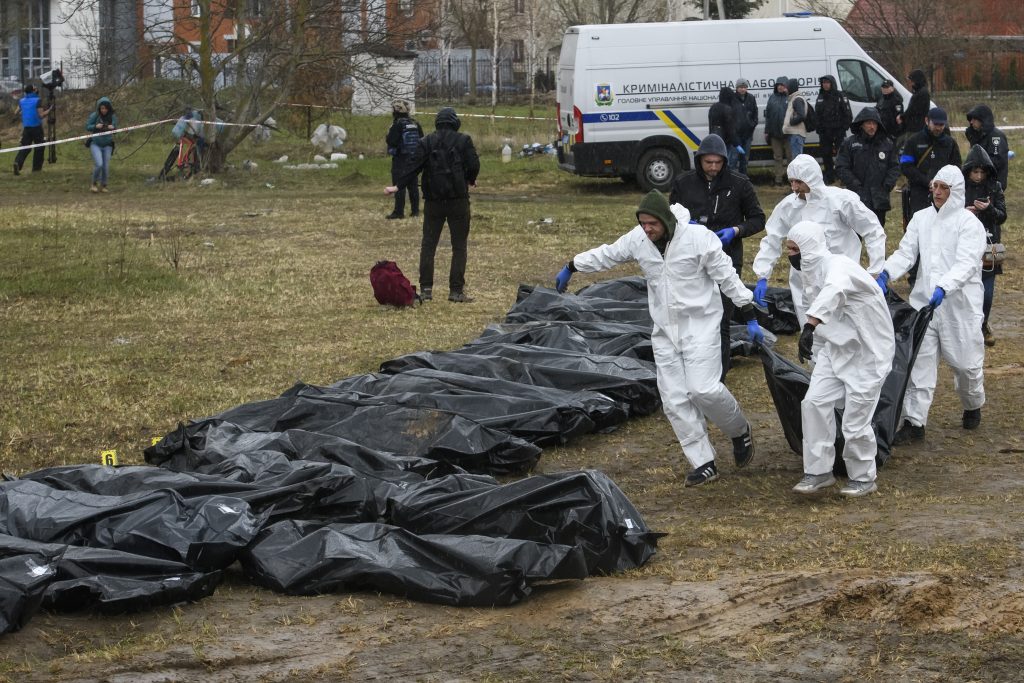
As we so deeply mourn for those killed, injured, and bereaved by the violence in Ukraine, our grief goes hand in hand with outrage at the brutality that has caused that destruction and suffering. This resort to subhuman behavior might at least remind us of what there is about being human that we so profoundly treasure. If many of us feel a deep, if unspoken, determination to do more than mourn – to do something to make of their deaths or their suffering something better and more lasting, we may be surprised to re-discover in that yearning a profound connection of humaneness (and I would say, of humanism) to democracy.
It is no accident that two of the most searingly memorable tributes to casualties of war – Pericles’ funeral oration during the Peloponnesian War and Lincoln’s Gettysburg Address — should both have retained their power, across such vast stretches of time, to inspire us to the defense and cultivation of democracy. In both these cases, the expression of deep mourning went hand in hand with the evocation of profound human values. Pericles spoke of the “exceptional grace and exceptional versatility” that he saw as characterizing his citizen soldiers, who had died that their neighbors might live such deeply human lives. It was this cultivation of humanistic virtues that had given Athenians the confidence to place power “in the hands,” Pericles said, “not of a minority but of the whole people.”

Drawing on Periclean strains, Lincoln spoke to the hope of his listeners “that these dead shall not have died in vain,” which depended on the survivors seeing to it “that government of the people, by the people, for the people, shall not perish from the earth.”
That democracy should not perish had, from the Civil War until quite recently, come to seem a rather matter-of-fact proposition. Now, though, there is a kind of shudder running through the earth, a shiver of trepidation that this may not by any means be a sure thing. If democracy is threatened by the raw brutality of the Russian invasion of Ukraine, we know that it is threatened, too, by other less bestial but equally deadly toxins. And if the horrors inflicted by the sub-human activities of Putin and his minions remind us at all of the human and humane values that have sustained democracy, this might be a good time to remember that human being, like democracy, must always be a work in progress.
We never get there and we never will, but that is nothing like an excuse to stop striving. The very notion that the fate of democracy may to a great extent depend (as it always has) on how fully human we manage to be in the living of our lives puts that fate where it must rest in any event – in your hands and in mine. If the brutality of war appalls us, let it at least appall us into remembering that our own lives are always, like democracy itself, a work in progress, and that at any given moment we have a choice about whether to live that life more or less humanely. How we choose may have more impact on the fate of democracy than anything else we can do.
Yet there is, in fact, more that we can do. We can support those practices, like open and honest deliberation, without which democracy is simply impossible. We can support institutional reforms that allow the human spirit to express itself more fully and effectively through our political processes. Ranked choice voting, for example, treats voters more humanely than our current either-or system, simply by recognizing than human life is never as black and white as that system forces us to treat it as being. Campaign finance reforms could eliminate the absurd (and inhumane) presumption that the more money you can spend in promoting your opinions or candidates, the more attention those candidates and opinions should receive.
Beyond the myriad ways in which we can humanize our political institutions and processes lie other challenges to and promises of democracy. One is simply to recognize how consequential and yet how elusive the project of being human really is. What it means (and what it takes) to be human is an endlessly open question – always (necessarily) complicated by the dynamic among individual and group urges and mandates, at all levels, including family, community and nation. It is the simultaneously consequential and yet elusive nature of being human that, finally, makes the serious study of the humanities such an indispensable element of democratic society.
It is because of this crucial and challenging human dimension that we have now reached a point where we must get far more serious about the prospects for global self-government. Notice that I didn’t say global government – not least because I don’t even pretend to know what form or forms would enable us to govern ourselves at the global scale. Yet in some form this must happen, as recent events make all too clear. It is humankind itself that must face the greatest challenges of this century. It is the species of Homo sapiens that is battling the ever-evolving COVID species, and it is our species that is changing the Earth’s climate. It is, therefore, as a species that we will have to figure out what to do about these and other challenges of our time.
Democracy is the claim that we, the people (at each of our human scales) can sort out the challenges appropriate to those scales. War – the quintessential failure of this faith – sometimes drives us to ask once again why we ever thought we could do this. But the very brutality of war has now and then directed our gaze beyond brutishness to behold and draw inspiration from what Lincoln called “the better angels of our nature.” Our human — our democratically humane — nature.
Daniel Kemmis is the author of Citizens Uniting to Restore Our Democracy



Leave A Comment